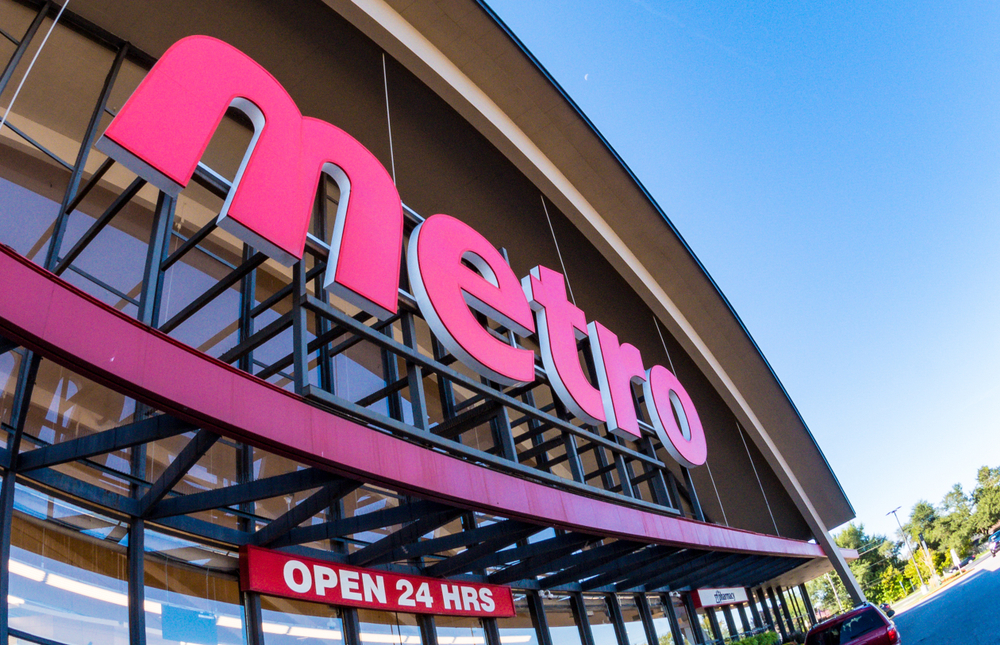Business and Economy
Metro to fast track tech deployment to boost productivity and profits

Meanwhile, Metro plans to install electronic shelf labels, which can digitally display and change prices, in 32 stores this year and 67 more stores next year. (File Photo: BobNoah / Shutterstock.com)
Metro Inc. will fast-track the deployment of technology such as self-service checkouts and electronic shelf labels to its stores in an effort to lower labour costs, the grocer’s chief executive said Wednesday.
The Montreal-based company expects to have self-service checkouts in 100 stores by the end of its 2019 financial year, which ends Sept.
29. It will equip another 100 stores in the following year.
Meanwhile, Metro plans to install electronic shelf labels, which can digitally display and change prices, in 32 stores this year and 67 more stores next year.
“We are accelerating because the financial returns are better,” CEO Eric La Fleche said during a conference call with analysts after the company released its third-quarter financial results.
“The combination of factors that are motivating us to speed it up: because they’re addressing business needs, customer needs and providing decent returns.”
Improvements in the technology are helping to drive its costs down, La Fleche said. Such technology allows for better productivity, so Metro can reduce some employee hours as well as use it to fill gaps in areas where it is difficult to find employees, he added.
The move also appears to be well received by many customers who make small purchases and prefer to use the self-service checkout, he said.
The retail industry has been shifting toward automation in recent years in response to rising labour costs and consumers who increasingly expect online shopping and home delivery.
Metro’s competitor Loblaw Companies Ltd. said at its annual general meeting that artificial intelligence and automation will change the nature of work done in its offices, distribution centres and stores.
The grocer has been adding self-service checkouts and electronic shelf labels to its stores, and started implementing algorithms using consumer data to try and boost profits.
However, the company recently admitted an overzealous attempt actually hampered sales in a recent quarter and the company is now correcting course.
The country’s major grocers are also investing in technology outside of their bricks-and-mortar operations. They’ve worked to boost their e-commerce offerings, prompted in part by online retail giant Amazon’s acquisition of Whole Foods and growing consumer demand for convenient options.
Loblaw has expanded its click-and-collect model through which customers order online and pick-up in store, as well as home delivery. Empire Co. Ltd., which operates Sobeys, partnered with the British firm Ocado and is building an automated warehouse in the Greater Toronto Area and one in Montreal to fulfil online grocery orders.
Metro, meanwhile, launched its online delivery service in Toronto earlier this year with orders picked by staff members at two stores, said La Fleche. The service is available to some 1.9 million households.
The company also reported Wednesday a third-quarter profit of $222.4 million, up from $167.5 million a year ago, as sales also climbed higher.
The profit amounted to 86 cents per diluted share for the 16-week period ended July 6, compared with a profit of 69 cents per diluted share in the same quarter last year.
Sales totalled $5.23 billion, up from $4.64 billion, boosted by the addition of Jean Coutu Group.
Metro “once again gave the market solid results,” wrote Irene Nattel, an analyst with RBC Dominion Securities Inc., highlighting solid same-store-sales growth amid an intense competitive environment.
Food same-store sales were up 3.1 per cent, while pharmacy same-store sales were up 3.4 per cent. The key retail metric for the food division was driven by modest growth in customer count, basket and tonnage, she wrote.
On an adjusted basis, Metro said it earned 90 cents per share in its most recent quarter compared with an adjusted profit of 75 cents per share a year ago.
Analysts on average had expected an adjusted profit of 92 cents per share for the quarter, according to the financial markets data firm Refinitiv.





















